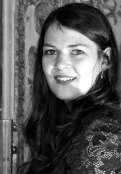
Portrait Pascal Le Mee
Constance Taillard interview by Nayoung Kim Millius, April 2023
Could you tell us about your first experience with the organ? How did you decide to pursue the path of a professional musician?
At the age of twelve I chose the organ as an optional class, in order to have the requisite courses for a diploma in harpsichord. The organ class lasted only a year, but I was encouraged to continue this instrument by my generous and charismatic teacher, Jean-Paul Rey. As a result, I enrolled in summer internships. These courses were led by internationally renowned musicians and played an important role in orienting me towards a career as organist. In addition to the courses, concerts, conferences, and workshops on improvisation, I was able to practice two hours each day on the organ. Upon receiving my baccalaureate, I decided to continue my musical studies in Paris.
What is the greatest beauty of the instrument for you?
Each organ is unusual in that it can produce a variety of sound quality as well as an enormous range in volume. In the space of a few seconds, it can go from an infinitely quiet tone to an impressive amplitude of sound. This alternation, for example, is similar to moving from the sound of a single instrument to that of a full orchestra and is one of the aspects that I appreciate the most about the organ.
What are the biggest difficulties you encounter as an organist?
As each organ has its own characteristics, it is always risky to propose a program without knowing the particularities of the specific organ you will be playing. In my first experiences as a concert performer, I made the error of choosing works whose range exceeded the organ’s keyboard or pedalboard. I therefore had to rewrite a few passages so that the work would sound correctly, despite the missing notes. For each recital, I plan a minimum of five hours on the organ to adapt to the configuration of the instrument (touch, layout of the keyboards, positioning of the pedalboard) and to plan the exact registration that will highlight the organ at its best. Concert organizers are not always aware of how much time is necessary and I have had experiences in the past when I did not have the proper allotment of time. Finally, many organs do not have a combination action, so, one or even two assistants are always an invaluable aid in ensuring that a registration change is perfectly executed.
Tell us about your program for the AOA concert.
In the program that I propose to the audience in the Auditoire this April 29th, I hope to replicate the sound of the 17th century organ, that was at the time, clearly recognized as the king of instruments in Germany, France, and Italy. In the beginning of that century, many brilliant composers began enlarging the musical scene by introducing new musical forms. My program aims to explore that emblematic repertoire, from free style to polyphony, via dance, taking place at the beginning of the Grand Siècle. The unparallel excellence found in these compositions already suggests the triumphal arrival of an unequaled genius, also represented in this recital: Johann Sebastian Bach.
What would be the place of organ music, most of whose repertoire consists of church music, in our current society? And its role in the future?
Whether one is a believer or not, church music has a unifying and reconciling effect on people. Music has the gift of revealing the best in ourselves and focuses us on the most important aspects of our lives.
What is your opinion on the role of organists and musicians for the younger generations? What would be, in your opinion, the impacts of your musical activities?
The profession of organist and musician is, in general, constantly evolving. Our role as mediator is fundamental today. We need to expand our audiences by making the organ better known. To achieve this, it is important to offer "mainstream" programs that are easy to listen to, while introducing new works that could arouse our listeners’ curiosity. The advice I would give to the young organists today would be, to encourage them to cultivate the multiple activities that revolve around this profession: recitals of course, but also interaction with audiences who might be less sophisticated and thus have less knowledge of the organ as an instrument. I would also stress the importance of teaching, the prominent role of the organ in our heritage, and the support of the various foundations and associations which today promote interest in our instrument.
A special message to the public of the Festival Souffle de Printemps?
It is sometimes difficult to take that first step and attend a concert featuring the organ, that mysterious instrument, often hidden from the public. And yet, the experience of such a concert might transport us into a new dimension which, in a brief instant, can give us an extraordinary feeling of tranquility. As in many situations, this feeling might only occur after attending a second or third concert. Let’s not hesitate any longer. Let’s embark together on this great concert adventure!
As an introduction to the April 29th concert, here is a link to videos of my past concerts. https://constancetaillard.com/